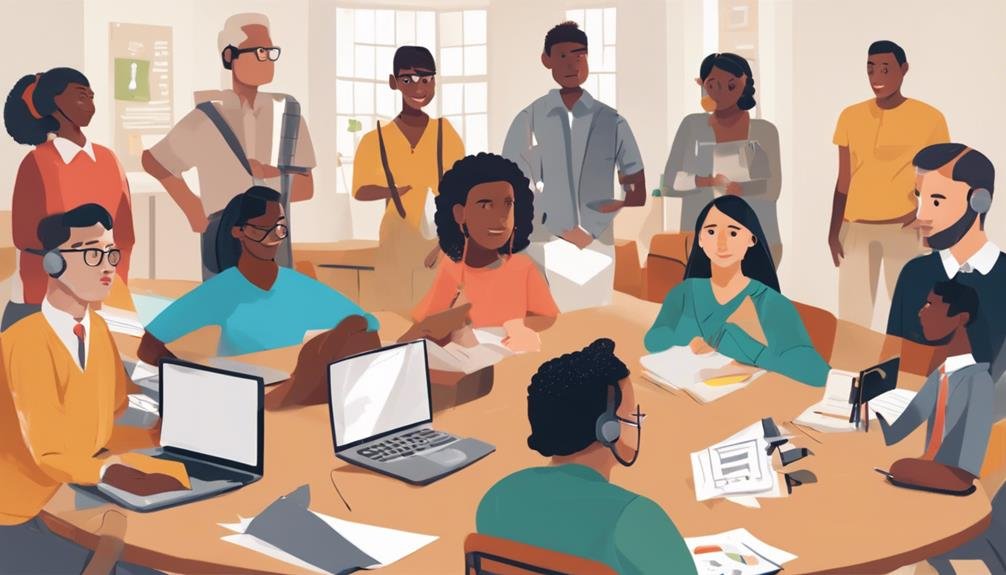Exploring a new culture can be like unraveling a complex puzzle, with each piece representing a unique challenge to your adaptation abroad. The journey is filled with unexpected hurdles, from the nuances of social norms to the intricate dance of currency systems. As you face these obstacles head-on, you’ll discover your resilience and uncover the hidden gems of personal growth that come with embracing cultural differences. But what are the top 10 challenges you might encounter during this transformative experience?
Key Takeaways
- Language barriers can impede fluency and comprehension.
- Social norms vary, affecting communication and relationships.
- Homesickness and isolation may impact well-being.
- Coping strategies include seeking support and self-care.
- Building a support system is crucial for success abroad.
Language Barriers
You’ll encounter language barriers that demand adaptability and persistence when traveling through a foreign country. These barriers encompass difficulties in fluency, comprehension, and adjusting to varied English language nuances. Standardized language exams might be necessary to showcase proficiency and match the pace and accent of native speakers. The cultural impact also plays a significant role in language learning, affecting communication effectiveness. Consistent practice, immersion, and embracing the opportunity to learn two languages simultaneously are essential to surpassing language barriers.
Navigating through varied English language nuances and accents can challenge understanding and adapting to different linguistic styles. The effectiveness of communication heavily relies on grasping the cultural context behind the language. Immersion in the local culture enhances language skills and fosters a deeper understanding of societal norms and customs. By actively engaging with the language and culture, you can bridge the gap created by language barriers and truly connect with the local community.
Social Norms and Customs
Exploring social norms and customs in a new cultural environment can be challenging.
Nonverbal communication cues, greetings, gestures, taboos, and traditions are vital in daily interactions.
Understanding and respecting these aspects are essential to fostering positive relationships and avoiding unintentional misunderstandings.
Nonverbal Communication Challenges
Understanding the intricacies of social norms and customs in nonverbal communication is vital for successfully adapting to a new culture abroad.
Cultural differences can greatly impact nonverbal communication, leading to potential misunderstandings. Gestures, body language, eye contact, and personal space norms vary across cultures, requiring high adaptability and cultural sensitivity.
Misinterpreting these nonverbal cues can hinder effective cross-cultural interactions. It is essential to be mindful of these differences and actively observe and learn about the nonverbal communication patterns in the new culture.
Greetings and Gestures
Mastering the art of greetings and gestures requires a keen understanding of social norms and customs across different cultures. Greetings and gestures are essential for communication and reflect cultural norms and values.
In some cultures, a warm embrace or a kiss on the cheek may be customary to greet someone, while a simple nod or bow might suffice in others. Being mindful of these cultural nuances is vital to avoid unintentionally offending.
For instance, a gesture as common as a thumbs-up can hold different meanings across cultures. By familiarizing yourself with the local customs related to greetings and gestures, you can navigate social interactions more smoothly and show respect for the cultural diversity you encounter abroad.
Taboos and Traditions
Cultural adaptation abroad involves negotiating a myriad of taboos and traditions, which significantly shape social dynamics and behaviors in different cultures. Understanding and respecting social norms and customs are essential for successful integration into a new cultural environment.
Often rooted in deep cultural beliefs, taboos guide acceptable behavior and interactions. Ignoring these taboos or traditions can lead to misunderstandings, offense, and social isolation. While some customs may seem strange or illogical from an outsider’s perspective, they hold immense importance within the local community.
Adhering to these social norms fosters mutual respect and facilitates smoother cultural adaptation. By being mindful of and adapting to these taboos and traditions, you can navigate social situations more effectively and build stronger connections with the local culture.
Homesickness and Isolation
Feeling homesick while abroad can profoundly impact your well-being, affecting your mental and physical health and your academic performance.
Isolation, whether due to cultural differences or academic pressures, can heighten these feelings of homesickness, making it important to establish coping mechanisms and a strong support system.
Overcoming isolation and homesickness involves actively connecting with others, seeking help when needed, and prioritizing self-care to navigate the challenges of cultural adaptation abroad.
Coping With Homesickness
Coping with homesickness and isolation while adjusting to a new culture can present significant challenges for individuals abroad. Addressing these feelings proactively is essential to maintain well-being and adapt successfully. Here are some strategies to help you navigate through homesickness:
- Actively connect with others in your new environment.
- Seek support from peers, counselors, or support groups.
- Practice self-care routines to nurture your mental and physical health.
- Understand the factors contributing to your feelings of loneliness.
- Embrace intercultural friendships to create a sense of belonging and connection.
Building a Support System
Traversing through the challenges of homesickness and isolation while abroad, establishing a strong support system is key to fostering a positive study abroad experience. Building a support network is essential in combating these feelings.
Interacting with fellow students, joining clubs, and engaging in social activities can help you create connections that provide emotional support and companionship. Research indicates that students with a solid support system have better mental health and academic performance.
Feeling connected to others reduces the impact of homesickness but also aids in adapting to a new cultural environment. These relationships offer a sense of belonging, which is critical for your overall well-being and success during your time abroad.
Overcoming Feelings of Isolation
To overcome feelings of isolation, actively engaging with others and seeking support can greatly impact your mental health and academic performance while studying abroad. Here are some innovative ways to combat loneliness and homesickness:
- Join social activities, clubs, and events to build connections.
- Stay connected with family and friends through technology.
- Practice self-care, including physical activity and a balanced lifestyle.
- Seek out counseling or support services offered by your institution.
- Remember that many international students experience similar feelings, fostering a sense of community and understanding.
Food and Climate Adjustment
Exploring food and climate adjustments abroad can present a notable challenge as you encounter new cuisines, ingredients, and environmental conditions distinct from your surroundings. Food adjustment involves embracing different tastes, textures, and cooking styles, which may require an open mind and willingness to try new things. On the other hand, climate adjustment demands adapting to varying temperatures, humidity levels, and environmental factors that can impact your well-being.
In some countries, limited food availability and variety may influence your dietary choices, potentially affecting your nutritional intake. Additionally, climate-related health issues like allergies or skin reactions could arise due to unfamiliar environmental factors. Cultural norms surrounding food consumption and meal times can further influence your food and climate adjustment experience abroad, as social dining practices may differ significantly from what you’re accustomed to.
Navigating these challenges with curiosity and flexibility can lead to a richer cultural experience and a deeper understanding of the intersection between food, climate, and cultural norms in your new environment.
Transportation System Navigation

Adapting to a new country includes mastering the intricacies of its public transportation system, which can be a complex task due to language barriers and unfamiliar routes. When faced with the challenge of getting around transportation in a foreign land, consider the following:
- Language Barriers: Overcoming language barriers is essential for understanding transportation signs and announcements and communicating with drivers or ticketing agents.
- Unfamiliar Routes: Familiarize yourself with different routes, stops, and transfer points to avoid getting lost or taking the wrong transport.
- Transportation Schedules: Follow transportation schedules to prevent delays and ensure that you arrive at your destinations on time.
- Local Language: Learning basic phrases related to transportation in the local language can greatly aid in asking for directions or assistance when needed.
- Utilize Technology: Transportation apps and maps can be invaluable resources for planning routes, checking schedules, and finding the best way to move around efficiently.
Local Laws and Regulations
Understanding a foreign country’s local laws and regulations requires a sharp awareness of potential legal pitfalls to guarantee a smooth adaptation process. Failure to comply with these laws can result in fines, legal consequences, or even deportation in extreme cases, disrupting your cultural adaptation journey. Various aspects such as behavior, dress codes, public displays of affection, and alcohol consumption may be heavily regulated in some countries, necessitating a keen understanding of the local legal framework.
To navigate the complexities of unfamiliar legal systems in a foreign land, it’s essential to familiarize yourself with laws concerning driving, employment, visas, and residency permits. Seeking guidance from locals, legal resources, or expat communities can provide valuable insights and assistance in ensuring compliance with local regulations. By proactively engaging with the legal requirements of your host country, you can mitigate the risks of facing legal issues that may hinder your cultural adaptation process.
Currency and Financial Systems

You must be attentive to exchange rate fluctuations to manage your finances effectively abroad.
Challenges with cashless transactions can arise due to differences in financial systems.
Understanding how local banking works will be essential for your daily expenses and budgeting.
Exchange Rate Fluctuations
Managing exchange rate fluctuations while studying abroad demands a keen eye for financial dynamics and an adaptive approach to handling costs effectively. Understanding currency exchange rates is important as fluctuations in the economic system can unexpectedly impact the value of money spent abroad. Here are five key considerations to help you navigate exchange rate fluctuations:
- Keep track of currency trends to make informed financial decisions.
- Utilize tools and resources to monitor exchange rate variations.
- Budget carefully to account for potential changes in purchasing power.
- Consider timing your currency exchanges strategically.
- Seek advice from financial experts or residents to effectively gain insights into managing exchange rate risks.
Cashless Transactions Challenges
Managing cashless transactions in a foreign country presents challenges due to variances in currency exchange rates and financial systems. Understanding local payment methods and digital wallets is essential for maneuvering this terrain.
Lack of familiarity with mobile payment apps and contactless payment systems may hinder financial transactions. Additionally, adapting to different transaction fees and banking regulations is vital for smooth cashless transactions in a new country.
Overcoming language barriers when using cashless payment methods requires patience and assistance from locals or resources. To thrive in this environment, it is important to stay informed about currency exchange rates and embrace new technologies like digital wallets and contactless payment systems to streamline your financial experiences abroad.
Understanding Local Banking
Mastering the intricacies of local banking systems abroad demands a keen understanding of currency dynamics and financial structures. When grasping local banking systems, you may experience culture shock as practices differ greatly.
Keeping an eye on currency exchange rates is vital to managing your finances efficiently and avoiding a financial burden. Familiarizing yourself with the local regulations and requirements can help prevent potential issues and streamline your banking experience.
Different banking practices and services in a foreign country can impact how easily you manage your expenses and access funds. Maneuvering local banking systems adeptly is essential for a smooth financial shift while abroad.
Educational or Work Environment

Getting accustomed to the educational or work environment abroad can present international students with unique challenges related to cultural differences in teaching styles, assessment methods, and academic expectations.
The shift in teaching styles, which may include more emphasis on lectures or group projects, can be disorienting. Additionally, diverse assessment methods such as exams, essays, or presentations may differ from what you’re used to, potentially impacting your grades.
Understanding academic expectations is important; this involves effective communication with professors, collaborating with peers, and mastering time management skills to meet deadlines. International students often feel pressured to adapt quickly, leading to stress and burnout.
Embracing challenges, seeking clarification, and researching can aid in successful adaptation. By acknowledging these differences and actively engaging with the new educational or work environment, you can navigate through the academic rigor and excel in your endeavors abroad.
Cultural Misunderstandings
Cultural misunderstandings often arise as significant barriers in intercultural interactions, leading to conflicts, misinterpretations, and breakdowns in communication. When moving through cultural differences, it’s vital to be mindful of various factors that can contribute to misunderstandings:
- Differences in gestures, body language, and non-verbal cues can significantly shape how messages are perceived across cultures.
- Misunderstandings of language usage, idioms, and humor can create barriers to effective communication and impact the intended message.
- Lack of awareness of cultural norms, values, and beliefs can result in unintentional offense or disrespect, hindering the establishment of positive relationships.
- Developing cross-cultural communication skills is essential for addressing cultural misunderstandings, requiring adaptability and empathy in intercultural interactions.
- Cultivating open-mindedness and a willingness to learn about different cultural perspectives can help mitigate conflicts and enhance cultural adjustment experiences.
Integration and Acceptance

Embracing local customs and traditions is essential for successful integration and acceptance in a new cultural environment. By immersing yourself in the practices and beliefs of the host country, you demonstrate respect and openness to new experiences. Building social connections becomes more manageable when you are interested in the local way of life.
Overcoming language barriers is another vital aspect of integration. Communication is the cornerstone of relationships, and trying to learn the language can bridge gaps and foster connections with the community. Cultural differences can be enriching if approached with curiosity and acceptance.
Actively participating in local activities and events helps you better understand the culture and showcases your willingness to engage with the community. Developing cultural intelligence and adapting to the host country’s norms is essential for smoother integration. By embracing diversity and being open to new perspectives, you pave the way for a more fulfilling experience abroad.
How Can I Overcome the Challenges of Cultural Adaptation Abroad?
When facing the challenges of cultural adaptation abroad, it’s important to remember a few cultural adaptation trips abroad. First, embrace the new culture with an open mind and willingness to learn. Second, seek to understand local customs and traditions and respect them. Finally, be patient with yourself as you adjust to your new surroundings.
Conclusion
As you navigate the challenges of cultural adaptation abroad, remember to embrace the unknown, open your mind to new experiences, and build connections with those around you.
As a seed grows roots in unfamiliar soil, you too can flourish and thrive in your new cultural environment. Stay resilient, stay curious, and let the beauty of diversity shape your journey towards integration and acceptance.
Embrace the differences, and watch yourself bloom in this vibrant tapestry of cultures.
FAQs
1. What Do You Find Most Challenging in Adapting to a Different Culture?
Adapting to social norms can be tricky in a new culture. Language barriers make communication tough. Adjusting to diverse cultural customs challenges you. Homesickness may hit hard when far from home.
These factors can make adjusting a real struggle. To thrive, try learning the local language, immersing in cultural activities, and seeking support. Overcoming these obstacles will help you grow and succeed in your new cultural environment.
2. Are There Any Challenges or Conflicts Related to Cultural Adaptation?
When adapting to a new culture, you may encounter various challenges and conflicts. Language barriers, social norms, food customs, and communication styles can all pose difficulties.
Additionally, clashes in values, cultural expectations, and identity crises may arise, leading to feelings of homesickness. Overcoming these obstacles requires patience, openness, and a willingness to learn.
3. What Are the Four Difficulties You May Face If You Go Abroad?
When you go abroad, you might encounter various difficulties. Language barriers could lead to isolation, making it tough to connect with others.
Understanding cultural norms and etiquette might be challenging and confusing for social interactions. Differences in food preferences and customs could impact your daily routines.
Adapting to new social traditions may also present hurdles. Prepare to navigate these obstacles with an open mind and willingness to learn.
4. How Do You Adapt to a New Culture When Studying Abroad?
When studying abroad, you must immerse yourself in local customs and seek guidance from experienced individuals to adapt to a new culture.
Embrace open-mindedness and be willing to adjust to new ways of living.
Engage in community events, learn the local language, and participate in social gatherings to build connections.
I have overcome language barriers, food preferences, and cultural expectations by being observant and adaptable in daily routines and social interactions.
Supportive Article
How Long Does It Take to Adapt to a New Culture?

